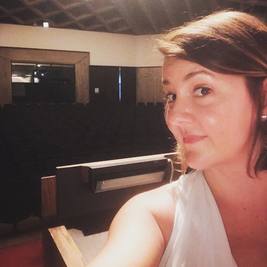 Pre-talk selfie at the Ohio History Connection's Crime & Corruption program Saturday, July 14, 2018. Organizers say they hope to make it an annual event. Pre-talk selfie at the Ohio History Connection's Crime & Corruption program Saturday, July 14, 2018. Organizers say they hope to make it an annual event. One of the truly unexpected outcomes from creating the Accused podcast has been the influx of invitations I've received to speak about my work. As a journalist, standing in front of a crowd talking about myself is never going to be a totally comfortable experience, but the crowd was awesome Saturday at the Crime & Corruption program hosted by the Ohio History Connection. There, I got to walk people through Beth Andes' case and highlight the importance of an openminded prosecutor. I also met the friendly guys who host the Columbus-based podcast True Crime Garage. They focused on one of Ohio's most enduring murder mysteries: the Sam Sheppard case. (Learn some basics here: http://www.famous-trials.com/sam-sheppard.) Overall, the whole thing was very cool, and if you're ever in Columbus, I highly recommend checking out the Ohio Village. What a cool way to walk back in time. Organizers of the program tell me they hope to make it an annual event, so keep an eye out at OhioHistory.org to learn if it's green lit for next year.
2 Comments
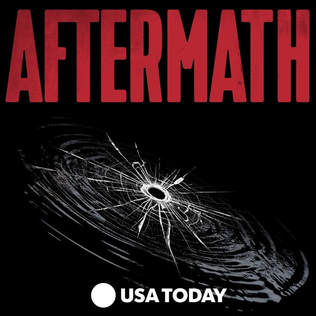 Aftermath is available on Apple Podcasts, Stitcher and wherever else you find your favorite podcasts. The project was a collaboration between The Cincinnati Enquirer and The Trace, a nonprofit newsroom that focuses exclusively on gun violence in America. Aftermath is available on Apple Podcasts, Stitcher and wherever else you find your favorite podcasts. The project was a collaboration between The Cincinnati Enquirer and The Trace, a nonprofit newsroom that focuses exclusively on gun violence in America. My latest project is the fruition of an idea I’ve had for nearly a decade (but which, coincidentally, has been more front and center of a national debate in recent months). As a reporter, I’d cover shootings routinely in Detroit, but if no one died, I’d often have to keep the tale to a brief. That always bothered me because I knew that even if everyone survived that incident, lives were changed — and not just the survivors’. Their family members and friends would be affected, too. To tell the stories presented in AFTERMATH, I’ve been traveling the country interviewing various survivors chosen because their backgrounds and circumstances differ so we could talk about many different issues survivors face — PTSD, ongoing disability, guilt, repression. Some were innocent bystanders. Some picked up arms after their shooting in retaliation, and today, a few have blood on their hands. If you've heard and liked the segments of My Favorite Murder that focus on the bad-ass survivors, this is for you. It's rawer, no doubt, because there are of course some dark issues that linger after someone has had a bullet enter their body. But these people's tales are as inspiring as they are harrowing. As this project dropped, I was amazed (I shouldn’t have been, but still ...) at how many people assume that if we tell survivors’ stories, we must be pushing gun control. The project intentionally steered clear of politics, aside from exploring survivors' beliefs when the shooting resulted in that becoming a big part of their lives. On the whole, this isn’t a policy project. It’s an empathy project. One person told me that telling these stories is manipulative and indicates I have an agenda. All I can say is that the stories are honest. They’re at turns brutal and infuriating and hopeful and inspiring. No matter your stance on gun control, I think you should understand what survivors go through. Wherever you land on the issue, you owe them to at least be informed and, more importantly, empathetic. Those accusing me of having an agenda are right, and my agenda is simple: I aim to tell human stories to help people understand the aftermath of gun violence. https://www.cincinnati.com/aftermathpod This is the second time I've been part of a Pulitzer Prize-winning newsroom. Both times, I helped cover the topic at hand, but this time, I'm officially one of the winners. We couldn't be prouder of the work we produced. Learn more here.
Here's a story explaining why:
http://www.columbusalive.com/entertainment/20170510/flyover-fest-amber-hunt-of-accused-at-wexner-center 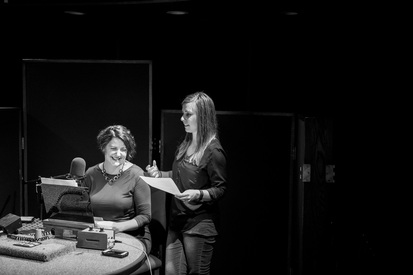 Photo by Meg Vogel. Photo by Meg Vogel. Originally posted at Cincinnati.com. The Cincinnati Enquirer’s first foray into true-crime podcasting became a podcast hit that’s so far been heard nearly 4 million times and is appearing on year-end “best of” lists nationwide. On Dec. 14, the series’ creators, Amber Hunt and Amanda Rossmann, will meet with listeners to discuss how the podcast unfolded behind the scenes – and reveal what’s been done since the show’s finale. “The response has been unbelievable,” said Hunt, reporter-turned-podcast host. “We thought we’d created something that was good journalistically, but we never had any clue it’d reach so many people and raise so much awareness.” Accused appeared for more than a week on iTunes’ list of top U.S. podcasts. It also reached No. 1 on the iTunes list in the United Kingdom. Hunt and Rossmann, the show’s producer, have received countless messages from all across the world, including New Zealand and Japan. The Dec. 14 event is meant as a thank-you to the series’ supporters and will be recorded for use in a possible upcoming podcast. Seats are limited and must be reserved at tickets.cincinnati.com. In addition to Hunt and Rossmann, Enquirer lawyer Jack Greiner – who played a key role in the podcast’s development – will be on hand to answer questions, as will Enquirer editor Peter Bhatia and Accused editor Amy Wilson. What: Live Q&A with the creative, editorial and legal team behind one of the most popular podcasts of 2016 Where: 1421 Main St. Cincinnati, OH 45202 When: Doors open at 6:30 p.m., event begins at 7:00. 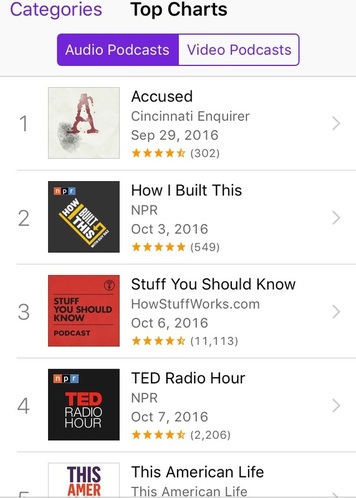 Here we are. We've been here a week. We had two goals when we set out: to ensure Beth's story wasn't forgotten and to help police solve the case. With more than 1.5 million downloads to date, I feel comfortable we've accomplished one of the two. Now I'm setting my sights on goal No. 2. It's been interesting hearing the response. Some people love the series, as evidenced by the plays and the tweets and the Facebook messages I've received. I can't even keep up with all the notes, so apologies if you've sent one and I haven't responded yet. Know that I read them, but that I simply get overwhelmed so some of them are being catalogued for the short-term. There of course has been criticism as well -- that I'm too aggressive, that we're exploiting Beth's story. I take it in because it's interesting and insightful. Yeah, I'm aggressive. It's my job, and I'm pretty good at it. Not perfect, mind you, but pretty good. And, yes, I'd even agree that we're exploiting Beth's story, but we're doing so to help highlight how a system that gets tunnel vision helps no one. But I hope that doesn't sound defensive, because I really appreciate the feedback. I didn't do anything differently on this reporting project than I'd do on one for print, so I usually only get feedback on the process from sources. I'm self-reflective enough for this to have been really cool to hear how I come across to strangers, for better and worse. That said, I wouldn't do much differently next time. Beth's story deserved to be heard -- read by some: exploited -- to expose problems within a system, and I'm a journalist because I push for answers. That's what I do. "News is something somebody doesn't want printed; all else is advertising," said William Randolph Hearst (a version of which is sometimes credited to George Orwell). If someone doesn't want it printed, it should go without saying that journalists wanting to write news sometimes are pulling info from less-than-willing sources. Accused is simply transparent about that process. We're being asked a lot whether we plan another season. We're not sure yet as we're just now coming up for air after this one. We're also making a point to catalogue all of the incoming tips and suggestions so that hopefully there's an Ep9 on Beth's story. I'm keeping my fingers crossed. Meanwhile, I'd like to send a big thanks to the crime pods that came before us. I hadn't listened to many of them before we recorded ours, to be honest -- I didn't want to be too influenced in how we rolled out our story, so a lot of my podcast research was in different genres (shout out to "How Did This Get Made" and "You Must Remember This," two of my staples). But now that mine is done, I've explored "In the Dark," "Criminal" and "Someone Knows Something." I recognized a lot of my own experience as a reporter with the latter especially -- feeling like shit sometimes, worrying about opening old wounds, questioning my reasons for being drawn to the case to begin with. I'm grateful these podcasts exist and that they seem to be created by kindred, truth-seeking spirits. My hope for them is the same as my hope for ours: May we all help solve the cases we cover. Anyone who's spent time with the victims' families know they deserve that much. 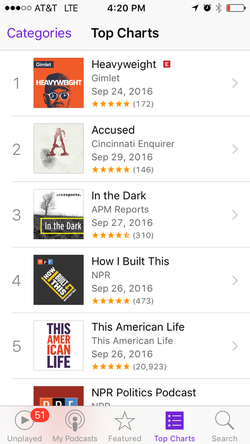 Just three weeks ago, my podcast "Accused: The Unsolved Murder of Elizabeth Andes" debuted. On Thursday, the finale for the eight-episode endeavor went live. It's been a hell of a month. My producer Amanda Rossmann and I have worked an insane number of hours, not only on the transcripts and promotion and teaser videos, but also on components of a special section to be released Sunday, Oct. 2. Amanda right now is sitting across from me working on a video for the project, trying to figure out how to condense dozens of hours of footage down to about 10 minutes for a newspaper audience. Today has been especially gratifying because "Accused" climbed to No. 2 on the iTunes' podcast chart nationwide. That's across all categories. I remember one colleague about six months ago quipping about how much time we were spending on a podcast that would likely have just 50 listens. Well, today we're cruising past the 500,000 mark on Soundcloud. To read more about today's milestone, click here. I don't write this to crow. In fact, I probably write this more out of sheer exhaustion than anything else. But I'm also writing from a place of gratitude: Thank you to my bosses at The Enquirer for believing in this and giving us the time to do it properly. Thank you to the Andes family for entrusting us to tell Beth's story. Thank you to Bob Young for never once asking us to omit anything or otherwise try to sway our coverage -- even knowing that we could very well have come to the same conclusion that prosecutors did all those years ago. Finally, big thanks to Debbie Lydon for recognizing that involving a newspaper might help further the case. Without that initial contact, we never would have done this. I'll quit with the sappiness now. Every now and then, it's important to acknowledge how grateful you are. This is one of those moments for me. To learn more about "Accused," please go to Cincinnati.com/AccusedPodcast. 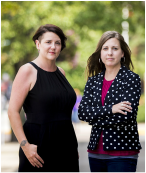 Amanda Rossmann (right) and me. Photo by Meg Vogel. Amanda Rossmann (right) and me. Photo by Meg Vogel. I haven't had my name much in the newspaper lately, and there's a reason. That reason was unveiled today. On Sept. 8, The Enquirer is debuting what I've been working on for the past year with Amanda Rossmann. I'm proud of it. I can't articulate how relieved I am it's almost out there -- and how anxious I am for people to hear it. I hope it does what I think it has the potential to do. To learn more: http://www.cincinnati.com/story/news/2016/08/27/introducing-accused-podcast-unsolved-murder-elizabeth-andes/89396140/ It's always a strange experience as a journalist to be asked to talk about yourself. Sure, I've written plenty of first-person accounts in the form of travel stories and such, but that's still working in the medium with which I'm most comfortable: writing. Speaking is another matter entirely. Still, I was surprised to have had a blast -- speaking flubs and all -- while delivering a TEDx Talk through Cincinnati's Xavier University in April. It was a great experience, and I've received wonderful feedback on the message overall. Bottom line: Journalists get lied to a lot. Your best bet is to assume no one's telling you the truth, ever. 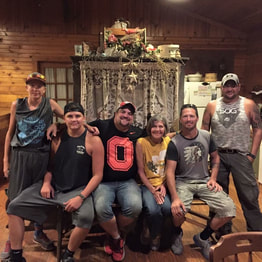 Brad Watts (sitting, centered) is pictured with members of the biological family he tracked down in 2015 after Ohio legislators unsealed 32 years of adoption records. Brad Watts (sitting, centered) is pictured with members of the biological family he tracked down in 2015 after Ohio legislators unsealed 32 years of adoption records. My latest story for Cincinnati.com highlights the real-life impact that an Ohio law change that unseals adoption records is having on families nationwide. Through the story, I got to meet Brad Watts, who was put up for adoption in 1975. For four decades, he wondered about his biological family, and, thanks to the law change, in 2015 he got to meet his mother, his father and a whole slew of siblings he never dreamed he'd have. Here's the story: http://www.cincinnati.com/story/news/2016/01/07/unsealed-adoption-records-reunite-families/77383544_/. The story was picked up and cited by People magazine as well. |
Hi.I'm an author, journalist, photographer and college instructor. Archives
March 2023
Categories |
| Amber Hunt | Musings |
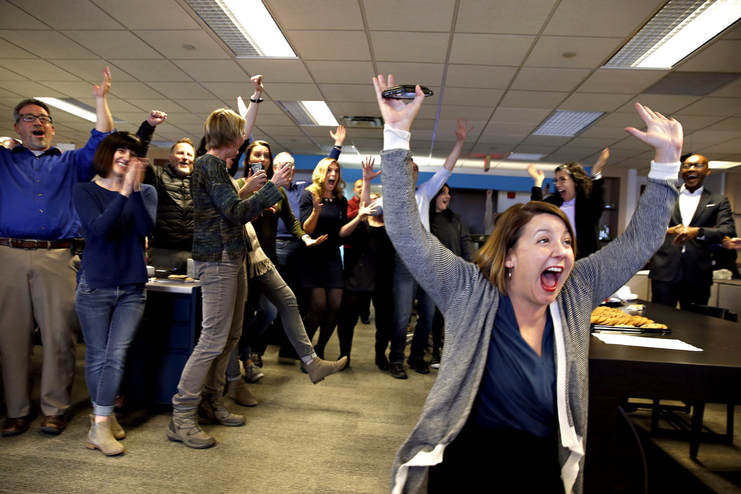
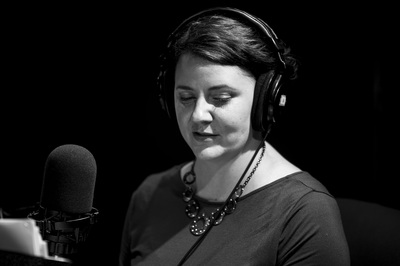
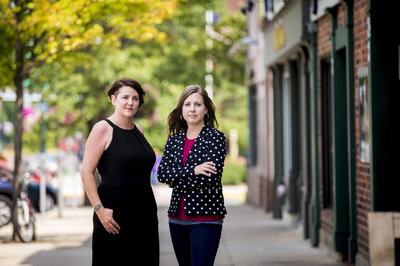
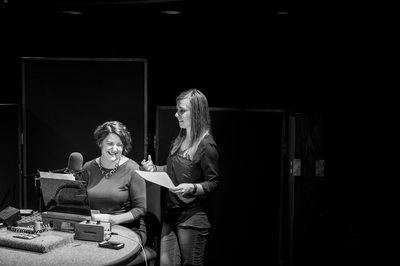
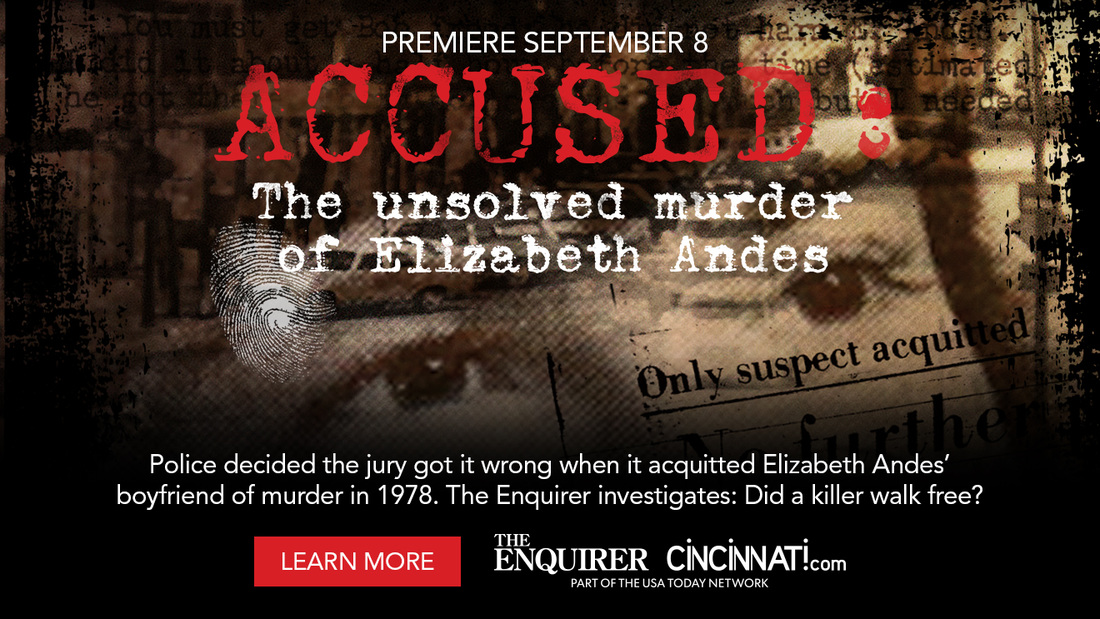
 RSS Feed
RSS Feed